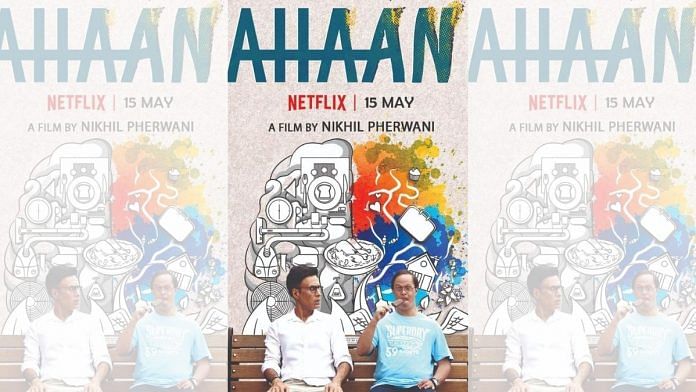New Delhi: Nikhil Pherwani’s film Ahaan, which aired on Netflix Saturday, tells the story of a 25-year-old boy with Down Syndrome, Ahaan, who strikes an unlikely friendship with his next door neighbour, Ozzy, who suffers from Obsessive Compulsive Disorder (OCD).
The 80-minute film follows the life of Ahaan, who lives in Mumbai with his parents. The character is played by first-time actor, Abuli Mamaji.
Though Ahaan helps with deliveries for his mother’s bakery business, he dreams of getting a job, having a wife and two children. Towards the middle of the film, he gathers the courage to ask Onella, played by Bombay Begums’ Plabita Borthakur, to join him on a picnic.
In sharp contrast to Ahaan’s charater, is that of his next-door neighbour, Ozzy – a high-strung businessman – played by Arif Zakaria, whose marriage with wife Anu, is strained owing to his obsession to keep things neat and hygienic in the house.
The only time Anu seems to smile on screen is when Ahaan comes to deliver brownies. Ozzy’s initial distaste for Ahaan, triggered by the young man’s dropping biryani on their sofa, later softens into a friendship, as Ahaan helps him reconnect with his wife.
Also read: Why Asia’s movie rebound is good news for everyone
Putting it together
Asked why he chose to contrast the two conditions, Pherwani told ThePrint, “Down Syndrome is a genetic disorder and OCD is a mental illness. I wanted to show how the stigma is different for each. Ozzy clearly needs help, but on the outside, he seems fully functional. Ahaan, however, is judged by society for the way he looks, but on the inside, he is content and ends up giving Ozzy the help he needs.”
Pherwani, who worked as an assistant director for Stanley Ka Dabba, spotted Mamaji at a research care centre in Mumbai in 2013, three-four years before the shoot began. Mamaji, who has Down Syndrome, said he was a big Salmaan Khan fan and expressed his desire to act, recalls Pherwani.
Casting a person who lives with the disorder was key for Pherwani, “as Indian cinema has traditionally made caricatures of differently-abled people”, he says, and gives the example of Tusshar Kapoor’s character [who can’t speak] in the Golmaal series.
The film offers a slice-of-life look at serious issues with hilarious encounters —from Ozzy’s therapist forcing him to overcome his fears by using a public toilet to Ahaan interpreting Ozzy’s job in trading shares as trading “lions” (sher is lion in Hindi).
(Edited by Poulomi Banerjee)
Also read: Hollywood’s Covid quandary — get back to work & risk infections or delay & lose business



